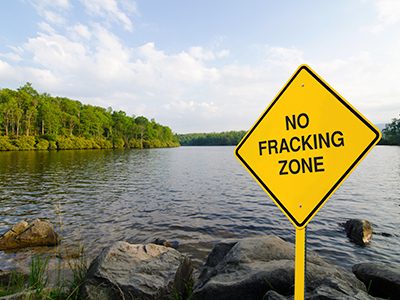 The fracking industry is used to meeting little resistance in disenfranchised states and countries. But here's what happens when they begin charging areas previously considered out of bounds–with residents who are far less compromised–such as Ithaca, N.Y., or, amazingly, the south of France.
The fracking industry is used to meeting little resistance in disenfranchised states and countries. But here's what happens when they begin charging areas previously considered out of bounds–with residents who are far less compromised–such as Ithaca, N.Y., or, amazingly, the south of France.
Before the most recent push into extreme energy, Big Oil and Big Coal had grown accustomed to operating in regions where they are so economically omnipotent that they pretty much ran the show. In places like Louisiana, Alberta, and Kentucky—not to mention Nigeria and, until the Chávez era, Venezuela—the fossil fuel companies treat politicians as their unofficial PR wings and the judiciaries as their own personal legal departments. With so many jobs, and such a large percentage of the tax base on the line, regular people put up with an awful lot too. For instance, even after the Deepwater Horizon disaster, many Louisianans wanted higher safety standards and a bigger share of the royalties from offshore oil wealth—but most didn't join calls for a moratorium on deepwater drilling, despite all they had suffered.
This is the Catch-22 of the fossil fuel economy: precisely because these activities are so dirty and disruptive, they tend to weaken or even destroy other economic drivers: fish stocks are hurt by pollution, the scarred landscape becomes less attractive to tourists, and farmland becomes unhealthy. But rather than spark a popular backlash, this slow poisoning can end up strengthening the power of the fossil fuel companies because they end up being virtually the only game in town.
As the extractive industries charge into territories previously considered out of bounds, however, they are suddenly finding themselves up against people who are far less compromised. In many of the new carbon frontiers, as well as in territories through which fossil fuel companies must move their product, the water is still relatively clean, the relationship to the land is still strong—and there are a great many people willing to fight very hard to protect ways of life that they view as inherently incompatible with toxic extraction.
For instance, one of the natural gas industry's biggest strategic mistakes was deciding it wanted to frack in and around Ithaca, New York—a liberal college town with a vibrant economic localization movement and blessed with breathtaking gorges and waterfalls. Faced with a direct threat to its idyllic community, Ithaca became not just a hub for anti-fracking activism but a center for serious academic research into the unexplored risks: it's likely no coincidence that researchers at Cornell University, based in Ithaca, produced the game-changing study on methane emissions linked to fracking, whose findings became an indispensable tool for the global resistance movement. And it was the industry's great misfortune that famed biologist and author Sandra Steingraber, a world-renowned expert on the link between industrial toxins and cancer, had recently taken up a post at Ithaca College. Steingraber threw herself into the fracking fight, providing expert testimony before countless audiences and helping to mobilize tens of thousands of New Yorkers. This work contributed to not just keeping the frackers out of Ithaca but to a total of nearly 180 fracking bans or moratoria adopted by cities and towns across the state.
The industry badly miscalculated again when it began construction on a 12,260-horsepower compressor station carrying Pennsylvania's fracked gas smack in the middle of the town of Minisink, New York. Many homes were within half a mile of the facility, including one just 180 meters away. And the town's residents weren't the only ones whose health was threatened by the station. The surrounding area is prized agricultural land dotted with small family farms, orchards, and vineyards growing organic and artisanal produce for New York's farmer's markets and locavore restaurants. So Millennium Pipeline—the company behind the compressor—found itself up against not just a bunch of angry, local farmers but also a whole lot of angry New York City hipsters, celebrity chefs, and movie stars like Mark Ruffalo, calling not just for an end to fracking but for the state to shift to 100 percent renewables.
And then there was the almost unfathomably stupid idea of trying to open up some of Europe's first major fracking operations nowhere other than the South of France. When residents of the Department of Var—known for its olives, figs, sheep, and for the famed beaches of Saint-Tropez—discovered that several of their communities were in line for gas fracking, they organized furiously. Economist and activist Maxime Combes describes scenes around southern France at the inception of the movement, where "the halls of the town-meetings in impacted communities were packed to overflowing, and very often, there were more participants in these meetings than inhabitants in the villages." Var, Combes wrote, would soon experience "the largest citizen's mobilization seen in the history of a Department that is usually on the right of the political spectrum." As a result of the industry's French folly, it ended up not just losing the right to frack near the Riviera (at least for now), but in 2011 France became the first country to adopt a nationwide fracking ban.









